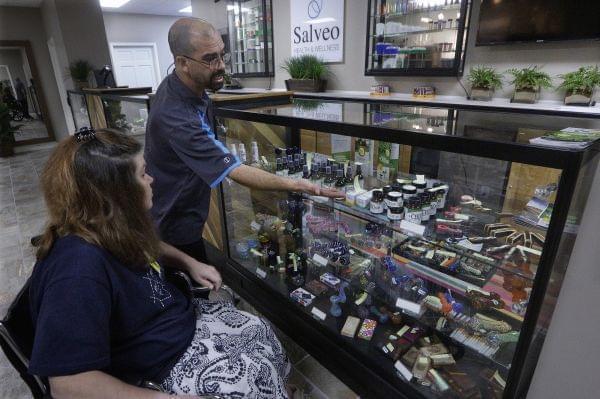Local Governments Opt Out Of Cannabis Sales; Campaigning With Childcare; A Social Media Feed Without ‘Likes’

A patient visits Salveo Health and Wellness, a licensed medical cannabis dispensary, in Canton, Ill. Seth Perlman/AP
Recreational cannabis will be legal in Illinois on January 1st. But it won’t be legal to sell everywhere, because some cities have voted to ban marijuana businesses in their communities. Plus, candidates running for federal office are now allowed to spend campaign money on childcare. We’ll look at how the culture around running for office and taking care of kids is changing. And Instagram is testing a feed that hides the number of likes on the posts you see. It’s an idea that Illinois artist Ben Grosser has worked on for years. We’ll speak to him about quality over quantity on social media.
On January 1, 2020, recreational cannabis will be legal across Illinois. It was one of many big-ticket items that Governor J.B. Pritzker signed into law after the legislative session earlier this year.
There’s a lot in this law — new taxes, regulations, and expungement opportunities for certain past low-level offenses.
But there’s another part of the law that’s creating debates in cities and towns across Illinois, and that’s the issue of selling marijuana. Even though cannabis will be legal to use all across the state, local governments are allowed to decide whether or not they want marijuana businesses to operate in their communities.
This summer, several municipalities have already decided to opt out.
We heard from Mayor Jeff Schielke of Batavia, who says he will veto any local measure that would permit cannabis sales, and Mayor Steve Chirico of Naperville, who says he supports opting in. We were also joined by Chicago Tribune reporter Bob McCoppin.
"If Naperville opts out and one of our border communities allows it," says Mayor @SteveChirico about selling legal marijuana, "if that operator is not operating responsibly, we have no say about that."
— The 21st (@21stShow) August 6, 2019
That's one reason he pushed to allow legal cannabis sales in Naperville.
Plus--
Running for office takes a lot of time and work. There are meet-and-greets, knocking on doors, and long hours on the phone soliciting campaign donations.
It can be especially taxing if you’re a parent with a full-time job. But now there’s a new policy that could help parents who are also political candidates: money for childcare.
Last month, the Federal Election Commission ruled that M.J. Hegar, who’s running for U.S. Senate in Texas, may use campaign funds to pay for daycare for her two kids. And in 2018 it allowed a New York House candidate to do the same.
This happened in part because more political candidates — Democrats and Republicans — have been asking the FEC to help make running for office easier for parents.
So what does this look like leading into the 2020 election?
Audrey Adamson is assistant director of Ready to Run Illinois, a program out of Western Illinois University that recruits and trains women to run for office. And Holly Kim won the office of Lake County treasurer last year.
Candidates running for federal office are now allowed to spend campaign money on childcare. What does this look like heading into the #2020elections?
— The 21st (@21stShow) August 6, 2019
More now w/@AudreyAdamson10 + @LakeCountyHolly https://t.co/hv2Jz4FSgr
Also--
Ten years ago, Facebook unveiled a new feature called the “Like” button. And these days it’s hard to imagine social media without it. On Instagram, users tap the “like” button billions of times a day.
But now, some of the largest tech platforms like Instagram, YouTube and Twitter are trying to limit the role of likes in your social media feed by hiding the number of likes or making it harder to see the number of people who’ve shared your post.
This idea has been around for years. And one person who’s been thinking about this for a while is Ben Grosser. Since 2012, he’s been exploring how the number of likes we get can shape our experiences on social media and beyond.
Ben is an artist and an assistant professor of new media in the School of Art and Design at the University of Illinois at Urbana-Champaign. He’s also the co-founder of the critical technologies studies lab at NCSA.
Ashley Carman is a reporter for The Verge.
"Now that our every social interaction is quantified and reflected back to us, it's difficult for us as users of these platforms not to focus on the numbers that are reporting our sociality," @bengrosser says. "The numbers feel addictive."https://t.co/Br0QJkO6b0
— The 21st (@21stShow) August 6, 2019
